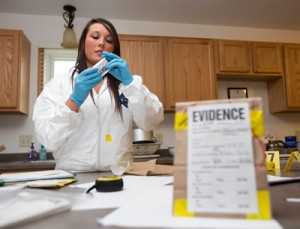PLATTEVILLE, Wis. – The University of Wisconsin-Platteville Forensic Investigation Program and UW-Platteville Department of Chemistry and Engineering Physics were the recipients of a generous donation of equipment from the U.S. Drug Enforcement Administration. Received were six balances and a gas chromatograph mass spectrometer with a combined value of $160,000.
UW-Platteville is the first and only public institution of higher education in the Midwest to grant the Bachelor of Science in Forensic investigation. Forensic investigation is one of the fastest-growing specializations in the discipline of Criminal Justice, educating students in various investigative methods and crime-scene processing techniques such as fingerprint identification, crime-scene mapping, legal aspects, and forensic photography. As part of its continuing efforts to provide the leading forensic investigation education and training, UW-Platteville recently opened the Forensic Investigation Crime Scene House (FICSH). The FICSH is one of only three such locations within the United States and the only one located in the Midwest and built specifically for forensic investigation.
The forensic investigation house is a 3,000 square foot facility ranch-style house with a partially finished basement. The first floor is arranged as a residential structure with the basement designed to incorporate the look and feel of a commercial structure, including an external entrance. The entire first floor, basement area and exterior of the house are wired with closed circuit digital video equipment that can be recorded and monitored, which gives instructors a unique method for critique. There are two one-way mirrors on the first floor that can be used for non-intrusive observation of training, such as simulated interrogations.
“This was a very significant donation to the forensic investigation and chemistry programs at UW-Platteville, and it could not have happened if not for the dedication of our faculty member Diana Johnson and her continued connection to the field,” said Aric Dutelle, associate professor of criminal justice who coordinates the UW-Platteville Forensic Investigation Program.
Johnson, who was a forensic serologist with the New Jersey State Police-Office of Forensic Sciences for more than seven years prior to joining UW-Platteville as assistant professor of criminal justice, facilitated the donation after attending American Academy of Forensic Sciences meetings and learning that DEA laboratories routinely donate equipment when they make upgrades.
When Johnson found out that the DEA was offering donations to educational institutions, she requested that the UW-Platteville Forensic Investigation Program be put on the list and then notified Dr. Chuck Cornett, UW-Platteville professor of chemistry, of the opportunity as well.
“The property donation is a win-win for all parties,” said Thomas Blackwell, laboratory director at the DEA’s Northeast Laboratory in New York City. “First, it allows our agency to properly dispose of used surplus property in an environmentally friendly way, and provides a sense of comfort both as a scientist and a taxpayer, that the instrumentation is going to good use. This allows the agency to make room for new equipment in order to stay current with today’s technological advancements. Secondly, the schools benefit by being provided relatively new equipment. This allows the schools and students to stay current with technology and gain valuable hands-on experience with the latest instrumentation and software.”
Johnson said the balances are a welcome addition to the UW-Platteville Forensic Investigation Program because they are more precise and accurate than the existing instruments. “Now we can conduct additional laboratory exercises and research projects,” she said.
The same is true for the chemistry-criminalistics program.
UW-Platteville’s existing gas chromatograph mass spectrometer is still in working order and will remain in service, but it is out of date and much older than the donated instrument.
Cornett said his students will use the new GCMS in just about all of their analytical work, both in class and for undergraduate research, to identify volatile compounds, such as those found in substances suspected to be methamphetamine. They will also likely use it in their daily work following graduation because all substances must be identified and confirmed before a case reaches the courtroom.
Blackwell said students who have opportunities to work with instruments like these at the college-level are in a much better position upon graduation to simply be able to walk into many laboratories and hit the ground running.
“This is a huge advantage for hiring personnel, as it eliminates much of the costly and time-consuming training aspects associated with new employees within companies and agencies,” said Blackwell. “I think the property donation program is a wonderful way to provide schools with much needed instrumentation and other scientific equipment, which may otherwise end up in a Dumpster or dismantled for parts. It gives me and my entire staff great pleasure knowing that our ‘used’ items are put to good use.”
Contact: Diana Johnson, assistant professor, UW-Platteville Department of Criminal Justice, (608) 342-1622, johnsondi@uwplatt.edu
Written by: Barbara Weinbrenner, communications specialist, UW-Platteville College of Liberal Arts and Education, (608) 342-6191, weinbreb@uwplatt.edu


